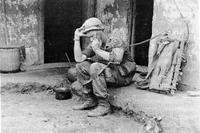Steve Schwab is CEO of the Elizabeth Dole Foundation, the premier national organization advocating for military and veteran caregivers. Patrick Murphy was the 32nd under secretary of the U.S. Army and the first Iraq War veteran elected to the U.S. Congress.
The COVID-19 pandemic is rapidly straining all aspects of our veteran health care system. While the professionals who provide world-class care in our Department of Veterans Affairs centers and hospitals do amazing work, their efforts are underpinned by the untrained army of family members and friends who care for our veterans at home.
It is these caregivers that we must now support.
Many veterans, particularly those struggling with emotional trauma, choose to trust their care to a close family member or friend. An estimated 5.5 million loved ones care for a veteran, providing upward of $14 billion worth of unpaid care every year and incalculable support to veterans' recoveries.
Moreover, home care can often be safer than putting a veteran in a nursing home or care facility during this pandemic. Three percent of COVID-19 cases and 27% of COVID-19 deaths occur in nursing homes, despite nursing home residents accounting for less than 0.5% of the U.S. population.
Caring for someone who served is complicated and challenging. Veteran caregivers often assist loved ones suffering with catastrophic wounds, and these vets rely on their caregivers for assistance from the moment they wake up in the morning to the time they are helped back into bed at night.
Veterans are also more likely to struggle with invisible wounds such as PTSD and traumatic brain injury. Misconceptions surrounding these cognitive wounds create an isolating effect for both caregivers and veterans. And if these circumstances weren't stressful enough in normal times, the COVID-19 pandemic has placed an even greater burden on the mental health struggles of all Americans, with greater rates of depression and suicidal thoughts reported.
In the best of times, military caregiving exacts a steep personal toll. Studies find these caregivers face increased rates of physical ailments, emotional distress, financial troubles, legal concerns and family strain. These rates are higher than those reported by civilian caregivers and non-caregivers alike.
Now, confronted by the threat of COVID-19, caregivers are reaching their breaking point. Most caregivers assist a veteran with a compromised immune system, making the stakes of infection much higher for both the veteran and caregiver. Shortages of hygiene and sanitization products have forced those providing amputee and wound care to desperately trade supplies online. Hardest of all, any assistance from family and friends has all but disappeared with social distancing.
In these hard times, we need to help veterans and their caregivers however we can. We must ensure these heroes do not toil in isolation and provide better resources from our government, local corporations, civic and faith organizations, and even as neighbors to offer caregivers a lifeline during these extraordinary times.
Among the resources already in place is a new emergency respite care fund created by The Elizabeth Dole Foundation in partnership with the VA. This fund will allocate 75,000 hours of professional at-home care at no cost to the caregivers, thanks to the generous support of CareLinx and Wounded Warrior Project.
Caregivers can apply at HiddenHeroes.org/respite. Available services include meal preparation, mobility assistance, dressing and bathing, and companionship. This respite care will offer military caregivers a critical opportunity to rest, recharge and focus on their own health.
As the nation marks November as National Family Caregivers Month, let's each take a step to let these hidden heroes know they are supported.
Caring for those who serve is an act of love. Our country has the opportunity to demonstrate that same love and care to both our veterans and their caregivers, in a way that can heal their wounds and unite our country.
-- The opinions expressed in this op-ed are those of the authors and do not necessarily reflect the views of Military.com. Find more information on how to submit your own commentary.















